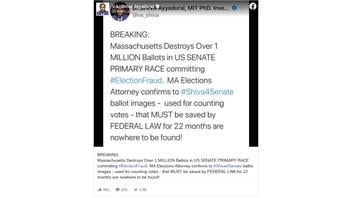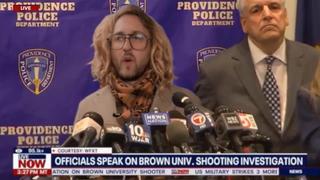STORY UPDATED: check for updates below.

Did Massachusetts election officials destroy more than 1 million ballots in the Republican U.S. Senate primary, as alleged by losing candidate V.A. Shiva Ayyadurai? No, that is not true. Election officials in the state told Lead Stories that it was "election misinformation" and that not even 300,000 ballots were cast in that race by Republicans. By law, state officials cannot destroy federal election ballots until 22 months after an election. Dr. Ayyadurai's representative later clarified to Lead Stories that he was not accusing the state of destroying the original paper ballots, but not saving digital copies that might have been generated during the count.
The claim appeared in a post (archived here) published to Facebook on Sept. 24, 2020, by a Facebook page named "V.A. Shiva Ayyadurai". The post is a picture of the author's own tweet, which read:
BREAKING: Massachusetts Destroys Over 1 MILLION Ballots in US SENATE PRIMARY RACE committing # ElectionFraud . MA Elections Attorney confirms to # Shiva4Senate ballot images - used for counting votes - that MUST be saved by FEDERAL LAW for 22 months are nowhere to be found!
This is what the post looked like on Facebook at the time of writing:
(Source: Facebook screenshot taken on Fri Sep 25 17:01:19 2020 UTC)
In a phone interview with Lead Stories on Sept. 25, 2020, Debra O'Malley, a spokeswoman for the Secretary of the Commonwealth of Massachusetts, said her office had notified Twitter the post violated "election misinformation" guidelines.
Here is the tweet, which was live the afternoon of Sept. 25, 2020:
BREAKING:
-- Dr.SHIVA Ayyadurai, MIT PhD. Inventor of Email (@va_shiva) September 24, 2020
Massachusetts Destroys Over 1 MILLION Ballots in US SENATE PRIMARY RACE committing #ElectionFraud. MA Elections Attorney confirms to #Shiva4Senate ballot images - used for counting votes - that MUST be saved by FEDERAL LAW for 22 months are nowhere to be found!
O'Malley stated:
Ballots that are cast in a federal election, and marked as such, according to federal law, cannot be destroyed or re-examined except in the case of a recount or a court order for 22 months after the election.
This law, she said, was followed for the Sept. 1, 2020 primary election, in which Kevin O'Connor won with 59.7% of the vote and Ayyadurai received 39.4%. The "misinformation" came after her office informed Ayyadurai -- a controversial politician who claims he invented email -- that cameras were not on the counters that were used in the primary. He apparently was asking for images of the ballots cast, and the same day he was told there were no images, he took to Twitter and Facebook and claimed they were destroyed, O'Malley said.
She sent Lead Stories this email that was sent to Ayyadurai at 10:47 a.m. on Sept. 24, 2020, apparently prompting Ayyadurai's tweet and Facebook post later in the day:
Good Morning-
I am writing to acknowledge receipt of your request for records. Please note, that this Office does not maintain voter tabulation software, firmware or hardware. While this office certifies voting equipment, as required by law, we do not purchase or lease equipment. Once equipment is approved by this Office, cities and towns can purchase or lease such equipment. Accordingly, this Office has no records responsive to your request.
Further, to the extent you request the same information from local election officials, please note that the approval of digital scan equipment in Massachusetts specifically prohibits the capturing of ballot images.
Michelle K. Tassinari
Director and Legal Counsel
Elections Division
Once cast, the ballots are sealed, O'Malley said. A total of 272,249 in the Republican primary this year and over 1 million total cast in the primaries Sept. 1, 2020, for all parties.
Ayyadurai's office did not respond to a call and message on Sept. 25, 2020. But after publication of this story -- and his seven-day suspension from Twitter -- Ayyaduri's team member said in an email to Lead Stories on Sept. 28, 2020:
Election officials are required to preserve all election materials for twenty-two (22) months in federal elections under federal law (52 U.S.C. Section 20701) and required to save all counted ballots which means digital ballot images since they are the ballots that are counted.
...
You destroy ballot images, you have committed a federal offense and committed election fraud. Don't allow public officials to perpetrate 'misinformation.'"
"The ballots are the ballots; they are the physical ballots marked by the voters," O'Malley said in response on Sept. 28, 2020. "And those ballots were sealed on Election Day, and they remain under seal in each election office."
Officials in Massachusetts said there are different machines in use in the state: two newer types in 212 Massachusetts communties with the ability to optically scan ballots -- which, under state law, is not allowed, so all cameras were turned off on primary day; 80 communities have older machines without the capability to scan and are being phased out; and 59 communities have old crank ballot-counters, for which each ballot must be hand-counted.
Massachusetts cannot under state law review ballots -- unlike some other states that can review as part of their election canvas, for example, or to check write-in candidates and ensure those were gathered the right way.
Moreover, Ayyadurai would not have been privvy to scanned images even if they existed; giving out such information is forbidden by state law. And, Ayyadurai, if he disputed the outcome of the election, had only to gather 10 signatures from inside a ward or precinct throughout the state to request a recount. He did not do so by the 5 p.m. Sept. 4, 2020, deadline, officials said.
Ayyadurai is no stranger to controversy. Among other things, on his personal website he claims to have invented email, an assertion that has been roundly debunked. Here is a page about the claims and his background.
Lead Stories has written about Ayyadurai before, including this story: Fact Check: Biological Engineer Did NOT Offer Medically-Supported Information In Viral Video
Despite it being false, the posts remain -- as does this interview of Ayyadurai and a story by the Gateway Pundit from Sept. 24, 2020. Here is the Facebook interview:
Updates:
-
2020-09-28T20:39:29Z 2020-09-28T20:39:29Z Updated Sept. 28, 2020, to include comments from Ayyadurai's team and a response from Massachusetts officials to the team's comments.


















